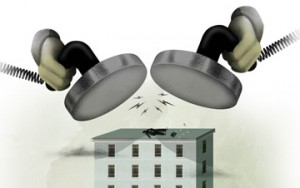The Pile for January 11, 2010
Topics
The Pile is our weekly guide to what we’re reading to become better managers.
At the top of our stack, of course, is the new issue of MIT Sloan Management Review, but there is plenty more piling up on our desks.
 There aren’t that many “rock star” economists, people whose names are recognizable to non-economists. In the U.S., at least, the left has Paul Krugman, the right had Alan Greenspan and maybe now has Gregory Mankiw, the wacky have Steven Levitt. As far as a full band of rock stars, the closest the world of economists gets to that is the Chicago School, the group of imposing conservative economists who, since the 1940s, have done their best to damn Keynesianism. From Milton Friedman to Richard Posner, the Chicago school has influenced both financial policy and how financial policy is taught. In The New Yorker, John Cassidy offers “After the Blowup,” which looks into how members of the Chicago School are responding to the economic collapse. In a story that reminds us of Leon Festinger’s When Prophecy Fails, Cassidy finds people all over the map, most interestingly Richard Posner (a judge, but certainly a part of school), who maintains “Keynes is back.” Nothing like a world-wide economic disaster to get some believers — but not all of them — to question their beliefs.
There aren’t that many “rock star” economists, people whose names are recognizable to non-economists. In the U.S., at least, the left has Paul Krugman, the right had Alan Greenspan and maybe now has Gregory Mankiw, the wacky have Steven Levitt. As far as a full band of rock stars, the closest the world of economists gets to that is the Chicago School, the group of imposing conservative economists who, since the 1940s, have done their best to damn Keynesianism. From Milton Friedman to Richard Posner, the Chicago school has influenced both financial policy and how financial policy is taught. In The New Yorker, John Cassidy offers “After the Blowup,” which looks into how members of the Chicago School are responding to the economic collapse. In a story that reminds us of Leon Festinger’s When Prophecy Fails, Cassidy finds people all over the map, most interestingly Richard Posner (a judge, but certainly a part of school), who maintains “Keynes is back.” Nothing like a world-wide economic disaster to get some believers — but not all of them — to question their beliefs.
Roger Martin is everywhere. The dean of the Rotman School of Business was profiled in a roundup of business school thinkers in The New York Times over the weekend and he’s recently published the blunt blog post Why Most CEOs Are Bad at Strategy. He states that “The two most fundamental strategic choices are deciding where to play and how to win” and argues that most CEOs concentrate on one and forget that they have to do both.
 And, finally, failure has been a topic we’ve covered occasionally here, and The Economist weighs in this week with a Schumpeter column on “Making a success of failure.” It takes on the most vivid example of business failure — bankruptcy — and how, even though “America’s excessive appetite for risk helped plunge the world into recession,” this country’s treatment of corporate bankruptcy “remains a beacon for the world …
And, finally, failure has been a topic we’ve covered occasionally here, and The Economist weighs in this week with a Schumpeter column on “Making a success of failure.” It takes on the most vivid example of business failure — bankruptcy — and how, even though “America’s excessive appetite for risk helped plunge the world into recession,” this country’s treatment of corporate bankruptcy “remains a beacon for the world …
